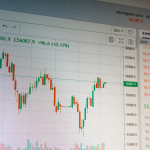
Impact of Global Events on ASX Performance: What Investors Need to Know

The performance of the Australian Stock Exchange (ASX) is influenced by a wide range of factors, including global events. Given Australia’s integration into the global economy, changes in the international landscape can have significant implications for ASX-listed companies and the broader market. In this blog, we’ll explore how global events such as geopolitical tensions, economic shifts, and natural disasters can impact ASX performance, and what investors should consider when navigating these changes.
The Global Economy and Its Influence on the ASX
As one of the major stock exchanges in the Asia-Pacific region, the ASX is closely tied to the global economy. When major global events occur, they often lead to ripple effects that can impact Australian markets, sometimes causing volatility. The performance of international markets, including the US, Europe, and Asia, can directly influence investor sentiment and, ultimately, stock prices on the ASX.
Australian companies that rely on exports or operate in sectors such as mining, energy, and agriculture are particularly sensitive to global events. A change in global demand for commodities or goods can significantly affect their stock performance. Similarly, any global economic downturns can reduce the buying power of foreign consumers and reduce demand for Australian exports.
Geopolitical Tensions and Their Effect on the ASX
Geopolitical events, such as international conflicts, trade wars, or political instability in key regions, can create uncertainty in the markets. For example, tensions between major powers such as the US and China can lead to market disruptions across the globe, including on the ASX. These types of events often lead to market sell-offs as investors move to safer assets, such as bonds or gold.
Additionally, geopolitical tensions can impact sectors such as defense, energy, and international trade. Australian companies with significant operations or trade relations with countries involved in a geopolitical dispute may experience disruptions to their business models, affecting stock performance.
Example: US-China Trade War
The US-China trade war, which began in 2018, had widespread effects on global markets, including the ASX. Australian companies that rely on trade with China, particularly in the mining and agriculture sectors, experienced volatility as tariffs and trade restrictions were imposed.
Economic Shifts and Market Sentiment
Global economic events, such as changes in interest rates, inflation levels, or major fiscal policies, can influence market sentiment, including on the ASX. For example, when central banks in large economies like the US or the EU raise interest rates, it can make borrowing more expensive and reduce consumer spending, which may affect Australian exporters and businesses with international exposure.
In addition, economic crises such as the 2008 global financial crisis (GFC) can have long-lasting effects on market behavior, including on the ASX. Investors often become risk-averse in uncertain economic climates, leading to increased market volatility. The global nature of financial markets means that a downturn in one part of the world can quickly spread and affect stock performance worldwide.
Example: COVID-19 Pandemic
The global economic shock caused by the COVID-19 pandemic serves as an example of how an unexpected event can drastically impact the ASX. During the initial months of the pandemic, the ASX saw significant declines as fears of an economic slowdown gripped investors. This situation led to widespread uncertainty, forcing many businesses to adapt rapidly to changing consumer behavior and supply chain disruptions.
Natural Disasters and Environmental Impact
Natural disasters such as earthquakes, floods, wildfires, and hurricanes can also affect the performance of the ASX, especially when these events occur in key regions that are important to the Australian economy. For instance, the Australian economy is highly dependent on natural resource exports, so any disruptions to mining or agriculture caused by severe weather events can have a direct impact on the stock prices of companies involved in these sectors.
Similarly, global environmental disasters, such as oil spills or widespread environmental damage, can influence international commodity markets, leading to price fluctuations that affect the ASX.
Example: Australian Bushfires and Impact on the ASX
The devastating bushfires that struck Australia in 2019-2020 affected many sectors, including tourism, agriculture, and insurance. Companies in these industries experienced significant disruptions, which led to declines in stock prices.
Investor Strategies in Response to Global Events
1. Diversification
Investors can protect themselves from the impacts of global events by diversifying their portfolios. By holding stocks from a variety of sectors—both domestic and international—investors can reduce the risk of being overly exposed to any single market event. Diversification allows investors to benefit from the performance of other markets and sectors while minimizing the risk of loss from any one event.
2. Stay Informed and Adaptable
Being aware of global events and their potential impact on the ASX can help investors make timely decisions. Staying informed about global economic indicators, geopolitical risks, and natural disasters can provide valuable insights into the potential risks and opportunities in the market.
3. Focus on Long-Term Growth
While short-term market volatility can be unsettling, it’s important to focus on long-term growth potential. Investors should look at the fundamentals of the companies they are investing in and consider whether global events are likely to have a lasting impact on their performance. Companies with strong management teams, solid business models, and exposure to growing sectors may be well-positioned to recover from global disruptions.
Final Thoughts
Global events have the power to influence the performance of the ASX, often creating volatility and uncertainty in the market. Geopolitical tensions, economic shifts, and natural disasters can all impact investor sentiment and stock prices. However, by diversifying their portfolios, staying informed, and focusing on long-term growth, investors can navigate these challenges and make informed decisions. Understanding the broader global context is crucial for successfully investing in the ASX and mitigating risks associated with global events.
By keeping a close eye on the forces shaping the global economy, investors can take advantage of opportunities and protect their portfolios from adverse effects.



